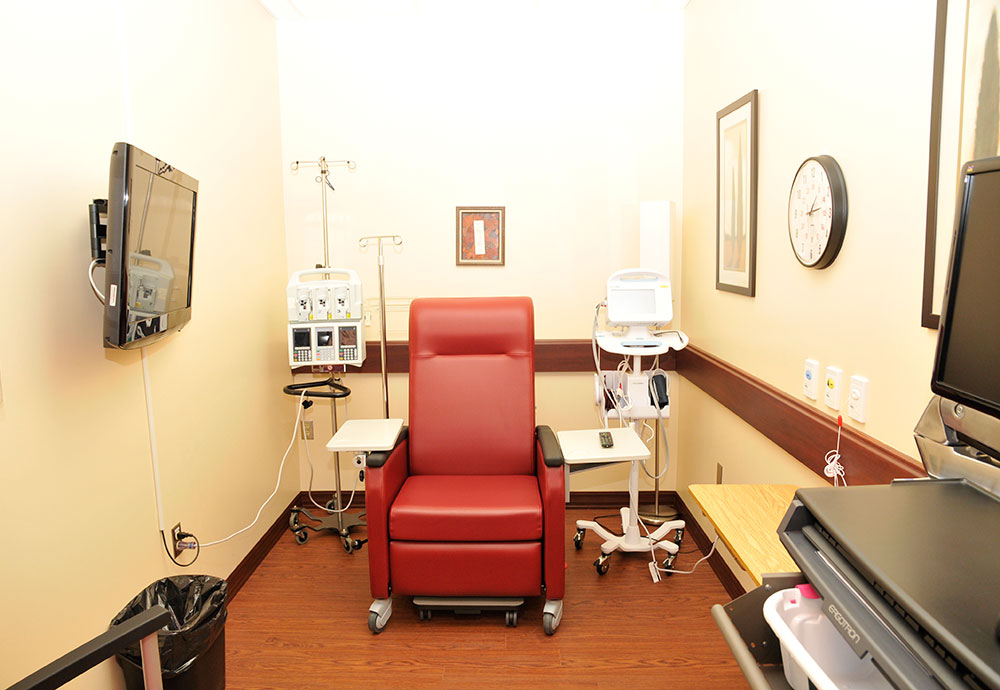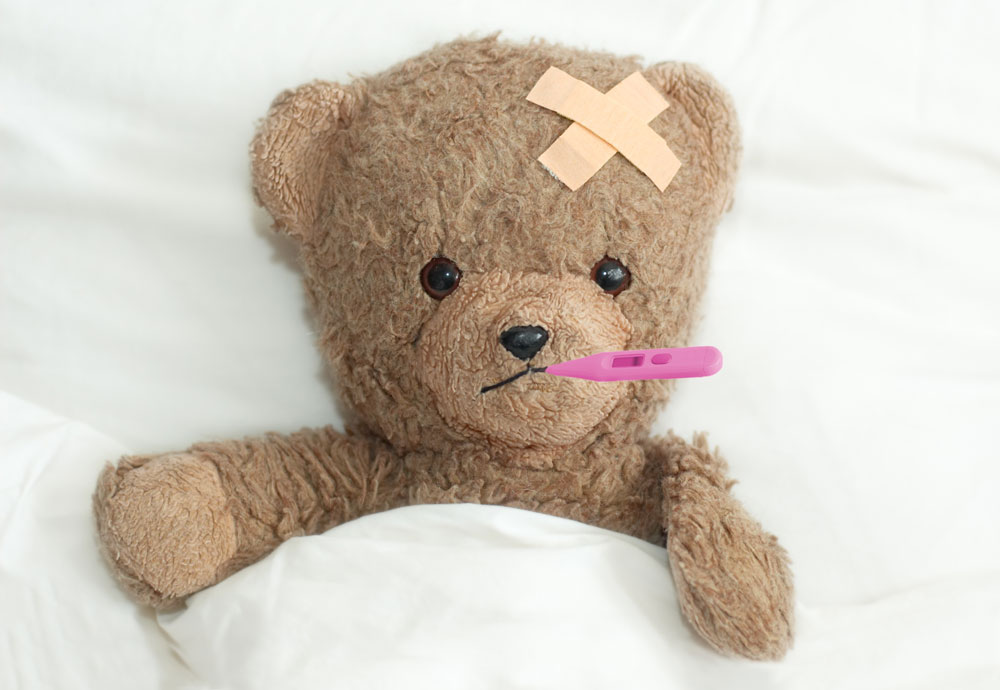Programs & Services
OUTPATIENT PROGRAMS
We offer a variety of programs not requiring overnight hospitalization. The programs include a chemotherapy clinic, a surgical clinic, clinical nutrition, specialty clinics and telemedicine services.
Chemotherapy
Clinic
Oncology Department
The Oncology Department is a satellite clinic for both Sudbury’s Health Sciences North and Thunder Bay Regional Health Sciences Centre enabling clients from Hearst and its’ surrounding areas to receive their cancer treatments close to home when possible. Patients are initially assessed with the Regional Cancer Program and then referred back to the Hôpital Notre-Dame Hospital Oncology Department.
As part of the Regional Cancer Program, the department provides a variety of services including outpatient cancer treatment, blood transfusion, phlebotomy and patient education.
Our trained nurses are in communication with the patient’s medical oncologist in order to ensure patient specific cancer treatments are administered in a timely and professional manner within their home community.
The department is designed to provide a relaxing, private environment, with each room having their own television. The nurses’ stations and medical equipment are also based in these areas.
We welcome and encourage a friend or a family member to be with the patient while they are receiving treatment. Since the treatment rooms are limited in size, only one visitor can be accommodated. Other visitors are welcome to remain in the waiting room.
Surgical
Clinic
The Pre-Admission Clinic prepares patients for surgery in several ways including providing information about the surgery, allowing the patient and family members to ask questions, and ensuring the patient is medically fit for surgery. The appointment can be the day before or several days before your scheduled surgery. The Pre-Admission clinic provides a pre-operative assessment for patients (adults and children) requiring surgery. The purpose of a visit to the Pre-Admission Clinic is to ensure patients are well prepared for their surgery or procedure.
We strongly encourage that you also bring a family member or other loved one with you to the appointment. Surgery can be overwhelming, making it difficult to take in all the information. Having someone with you who can help you process the information and provide you with support can make it easier for you.
The Pre-Admission Clinic is a good time to bring up questions you may have about your surgery. At the clinic patients may experience any number of the following activities:
- The nurse will ask the patient questions about their health.
- Teaching about the operation or procedure, what will happen and what are the important things patients need to know.
- Discuss the care that the patient will experience before and during hospitalization.
- Instructions regarding medication (if any) and its use before surgery.
- Blood tests, x-rays or electrocardiogram.
Please bring your Ontario Health Card with you. Please also bring your completed package and all medications in original containers.
It helps to do some advance planning before your surgery to help things run as smoothly as possible for you and your family. Here are some things to think about:
- Notify friends and family who should know about your surgery.
- Plan a ride to and from Notre-Dame Hospital.
- If you are being admitted as an inpatient for your surgery for one night or more, pack personal items including grooming items (toothbrush, hair brush, etc.), glasses or contacts, medical assist devices (hearing aids, dentures, etc.), and a book or other activities.
- Make sure you have your Health Card available.
Getting ready for your surgery is an important part of making sure the surgery and your recovery go well.
- It is important to clean your skin as well as possible to lessen the chance of infection. Take a shower or tub bath using chlorhexidine soap (i.e. Dial) the night before AND the morning of your surgery. Cleanse the area where you will be having the operation by rubbing it with soapy water for 5 minutes. Rinse and dry well.
- Remove nail polish, makeup, and all jewelry including body piercings.
- Sleep is important before surgery, so go to bed in plenty of time to get a full night’s rest.
- Do not eat or drink anything after midnight on the night before the operation.
- Do not drink alcohol for 48 hours before your surgery as this could increase your risk of bleeding as well as other health risks.
- Do not smoke after your evening meal the night before surgery as this can cause more secretions in your lungs, leading to breathing problems after your surgery.
- Follow the instructions your doctor gave you about taking any medications on the day of your operation. If you are to take any medications you may do so with a sip of water. (Tell your nurse which medications you have taken when you arrive at the hospital.)
- If you develop a fever, cold, or flu-like symptoms before your surgery, please call the hospital.
- Arrange for a ride to and from the hospital.
Most of the details of your surgery will have already been taken care of during your Pre-Admission Clinic Appointment and other appointments with your surgeon and primary care provider. Very little has to be done on the actual day of your surgery except to ensure that all jewelry, nail polish, and makeup are removed, and you have washed with chlorhexidine soap.
While you are in surgery, family members and loved ones can wait in the hospital front lobby.
Those undergoing outpatient surgery will be discharged the same day after a short recovery period (this period varies according to your condition). Please make sure you arrange for a ride before you come in for surgery.
If you require multiple days of recovery, you will be admitted to the Acute Care floor, located on the third floor.
Recovery is, of course, a big part of surgery, and you can actively participate in helping yourself get better. Your surgeon/healthcare team will have information for you about medications, wound care, and other important parts of your recovery. Arrangements for home care, if needed and follow-up appointments are usually given to you before you are discharged.
- Understand and follow your surgeon’s instructions, and ask questions if you don’t understand.
- While at the hospital, your nurses and other healthcare professionals (as needed) will help with your recovery, including any specific treatments prescribed or recommended by your surgeon.
- Part of these treatments may be exercise, physical therapy, or other activities.
- You may be on a restricted diet after your surgery as well, so always discuss any “outside food” with your nurse.
- If you have any questions about your care, any problems managing your pain or wound care, or any other concerns at all, please talk to your nurse.
Outpatient surgery patients (adults and children) receive pre and post-operative care in the day surgery department. A variety of services can have outpatient (day) surgery procedures:
- General surgery
- Dental surgery
- Orthopedics
- Urology
- Gynecology
- Endoscopy
- You are required to report the registration area two hours before your surgery.
- Leave all your valuables at home (jewelry, money, purse).
- Bring your Ontario Health Card with you.
- You will be registered and asked to submit or confirm your insurance information.
- From the registration area, you will proceed to the Day Surgery department to prepare for your surgery.
- You will be asked to change into hospital attire (gown, housecoat and slippers).
- A nurse will:
- Ask when you last ate and drank.
- Take your height and weight if not already obtained in the pre-admission visit.
- All patients must meet a specific set of discharge criteria before they are able to be discharged home. The time you will spend in the Day Surgery department will depend on what type of surgery you had, what type of anesthesia you had and how you are feeling after surgery.
- This discharge criteria is based on how awake you are, how much pain you are having, and if you are “back to normal”.
- If you are having post-operative pain and/or nausea, you will be given medications for this before discharge from day surgery.
- Post-operative teaching and discharge instructions and follow-up appointments, if needed, are given to each patient before discharge from day surgery.
- Your nurse will review them with you before you go home.
Information Regarding Our Facilities & Procedures
Hôpital Notre-Dame Hospital is a modern 44-bed, fully-accredited hospital which serves a population of some 10,000 people with its 160 full and part-time employees. Hôpital Notre-Dame Hospital provides a wide range of health care programs and services: emergency, diagnostic imaging, laboratory, respiratory therapy, chemotherapy, ambulance services, acute care, chronic care, pharmacy, clinical nutrition, electrocardiography, physiotherapy, surgery, diabetes education. Specialty clinics in cardiology, internal medicine, pediatrics, urology, orthopedic, gynecology, ENT, etc. are held on a regular basis. The team works in close relationship with several visiting specialists, the Timmins and District Hospital and the Thunder Bay Regional Health Sciences Centre.
The
Operating Room
Department
- Very dynamic and experienced nursing team
- State-of-the-art equipment
- 2 new anesthesia machines – Datex Omheda
- State-of-the-art equipment for scopes – Fuginon system + scopes
- 2 local GP anesthetist to support the surgery program
- Potential partnerships with OR programs of surrounding communities
Facilities, Volume & Cases
Of The Operating Room
2017/18 SURGICAL PROCEDURES |
REQUIRED EXPERIENCE |
|
Inpatients | 73 Outpatients | 745 Consultations | 1236 |
C-section Laparoscopic surgery General surgery in a rural setting |
Physical Environment
- Two operating theatres
- Recovery Room
- Day Care surgery
- Physician lounge
- Consultation clinic (2nd floor) – free
The Team
- Surgery services presently ensured by a team of 5-6 locums alternating on a regular basis
- Full complement of Anesthesia services provided by two local family physicians
- 8 Family physicians
- Team of experienced OR nursing staff
- Hospital associated services: RT, PT, Lab, Radiology
- PACS, OTN videoconferencing, CritiCall services
- Collaboration and support from Timmins and District Hospital (275 km) and Kapuskasing Sensenbrenner Hospital (100 km).
- MRI located in Timmins
- CT scan on site.
The Equipment
- Laparoscope 0° – 30° – choledofiberscope
- Pliers & wire cutter
- Cystoscope rigid and flexible
- Gastroscope
- Colonoscope
- Hysteroscope + resectoscope for TURP and endometrial ablation
- Tourniquet for blocks
- Irrigation system for laparoscopy – Hydroflex
- Ligature-GIA-endogia-surgetie
- Some ortho equipment:
- 3 M mini driver drill
- Synthes hand modular system
- Accutrak microsystem screws + plate
- Synthes small fragment set
- Steimans pin, K-wire
- Rongeur – bone cutter – curettes
- Cheisel + osteotomes – elevators
- 2 anesthesia machines – Datex Omheda
- Different mesh for lap + open hernia repair
- RUMI system for lap hysterectomy
Frequent Cases
- Appendectomy
- Lap appendectomy
- Baron ligature
- Colonoscopy
- C-section
- Cystoscopy – prostate biopsy
- Dental procedures
- Dilatation & Curettage
- Excision cystic lesion
- Fistulectomy
- Gastroscopy
- Hand surgery: (Carpal Tunnel, tendon repair)
- Haemorrhoidectomy
- Hernia repair – Lap + open
- Hydrocelectomy
- I&D abscess
- Laparoscopic cholecystectomy/open cholecystectomy
- Lumpectomy
- Lymph node biopsy
- Marsupialization pilonidal sinus
- Repair of lacerations
- T&A
- LEEP – TVT-O
Common Cases
- Biopsy
- Circumcision
- Excision of lipomas
- Hysterectomy
- Laparoscopy
- Tubal ligation
- Laparoscopic hysterectomy
Occasional Cases
- Amputation
- Bowel resection
- A & P repair
- Laparotomy
- Marshall Marchetti
- Mastectomy
- TURP
- Vasectomy
- Circumcision
- Open reduction with fixation
Clinical
Nutrition
The Clinical Nutrition Department provides nutrition assessment, therapeutic interventions, nutrition counselling and education to inpatients.
The registered dietitians/certified diabetes educators provide education and teaching materials for inpatients. They also implement individualized nutrition care plans to suit each patient’s specific needs. Our dietitians work to improve patient outcomes through evidence-based practice in collaboration with other team members to ensure optimal nutrition.
Hôpital Notre-Dame Hospital does not provide outpatient nutrition services, with the exception of those patients referred to the Nord-Aski Diabetes Education Centre; however, outpatient dietitian services are offered at the Nord-Aski Family Health Team.
Hôpital Notre-Dame Hospital’s dietitians also provide nutritional consultations to the Foyer des Pionniers long-term care home.
Telemedicine
Hôpital Notre-Dame Hospital is partners with the Ontario Telemedicine Network (OTN)
Telemedicine is an amazing technology that can truly help improve the lives of patients in remote communities by keeping them at home and independent. It uses a variety of technologies to bring care to the patient, including secure two-way videoconferencing and Store Forward technology.
Physicians and other health care professionals are able to assess, diagnose and treat patients without requiring them to be physically present in the same location. It allows patients, their families, and their community health-care providers to have greater access to a wide variety of services in their home community.
It also offers the delivery of distance education and administrative meetings for health care professionals and patients.
A telemedicine appointment is similar to a regular visit, the only difference is that you will see and talk to the doctor through a television screen. Your appointment will take place in a private room and all information is treated within strict privacy guidelines.
- You need to register with your Health Card directly at the Telemedicine Department.
- You will be asked for a recent medication list.
- You may be asked to change into a hospital gown, depending on the type of appointment.
- The length of the appointment will vary depending on the health care professional’s preferences.
- Your telemedicine coordinator has several specialized diagnostic equipment that will assist your health care professional during the appointment. These include a hand-held exam camera with a 10x magnifying lens, otoscope and an electronic stethoscope with Bluetooth capabilities.
- Typically, the telemedicine coordinator will stay in the room with you during the consultation, and sometimes the local physician or health care professional will attend as well. The patient is welcomed to bring a family member or friend with them.
- All information is documented and a copy will be sent to the referring professional.
- Ask your health care provider if a telemedicine visit is appropriate for you. Telemedicine is useful for many appointments, but may not be appropriate for all. The specialist will make that determination at the time of the referral.
- If you receive an appointment that you will need to travel, you could contact the health care professional’s office and ask if they could see you via OTN instead. At times they may be able to accommodate.
Referrals will be made by the physician, specialist or nurse practitioner to the Ontario Telemedicine Network (OTN) Scheduling Department or directly to the health care professional that is requested and you will then be contacted directly with your appointment date and time.
- Using this service is safe and secure, ensuring that your visit and personal health information are kept confidential at all times.
- Telemedicine uses a secure, encrypted network to transmit your visit. This ensures the protection of your privacy.
- The appointment takes place in a private, secure room.
- Other than the people present in your studio and the consultant’s studio, no one else can watch your appointment.
- Your visit will not be videotaped or recorded.
Teledermatology Services
Telederm allows professionals to send referrals to an Ontario-based dermatologist. This service uses a digital camera and a web-based browser supported by OTN.
A picture of the patient’s skin condition will be taken. The photo, patient information and history will then be sent using OTN’s store forward service to the dermatologist for review and to issue a report to the referring professional with a diagnosis and a suggested plan of care.
Your appointment will take place in a private room and all information is treated within strict privacy guidelines.
- You need to register with your Health Card directly at the Telemedicine Department.
- You will be asked for a recent medication list.
- You may be asked to change into a hospital gown depending on the location of the affected area.
- A digital photograph of the affected area and a brief history of your skin condition will be taken.
Your health care professional can fill out a Telederm Referral Form and fax it to the Notre Dame Hospital telemedicine coordinator.
The telemedicine coordinator will call you and make an appointment to meet with you at the Telemedicine Department.
Specialty
Clinics
Hôpital Notre-Dame Hospital Specialty Clinic is an outpatient service, located in the new extension, in which health care specialists provide diagnostic evaluation, treatment, and/or management of health conditions not generally part of family practice care.
We offer a vast array of services from medical and surgical specialists for new and follow-up patients. Clinics include allergy and allergy testing, general surgery, cardiology, otorhinolaryngology (ear, nose and throat), CNIB, gynecology, internal medicine, orthopedic, pediatrics and urology.
All patients requiring an appointment in these clinics must be referred by a family physician or referring doctor.
Preparing for Your Visit
Please arrive 15-30 minutes earlier than your scheduled appointment time. Proof of a valid Health Card is required at each visit. Bring your medication with you.
Patients need to register at Central Reception from 7:30 a.m. until 4:00 p.m. and register directly at the clinic situated on the second floor after 4:00 p.m.
Please present yourself at the registration desk upon arrival. Patients will be called in order of appointment. Wait times can vary depending on activity of the clinic that day.



